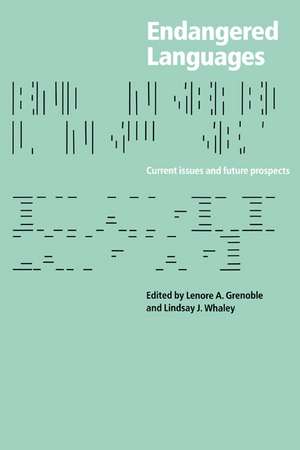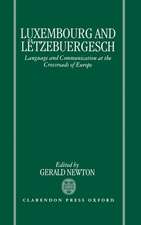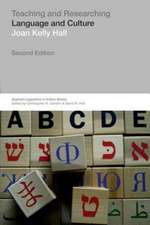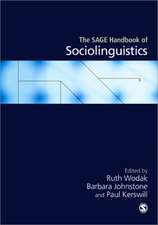Endangered Languages: Language Loss and Community Response
Editat de Lenore A. Grenoble, Lindsay J. Whaleyen Limba Engleză Paperback – 25 mar 1998
| Toate formatele și edițiile | Preț | Express |
|---|---|---|
| Paperback (1) | 419.78 lei 43-57 zile | |
| Cambridge University Press – 25 mar 1998 | 419.78 lei 43-57 zile | |
| Hardback (1) | 785.48 lei 43-57 zile | |
| Cambridge University Press – 12 mar 1998 | 785.48 lei 43-57 zile |
Preț: 419.78 lei
Preț vechi: 471.66 lei
-11% Nou
Puncte Express: 630
Preț estimativ în valută:
80.35€ • 87.31$ • 67.54£
80.35€ • 87.31$ • 67.54£
Carte tipărită la comandă
Livrare economică 21 aprilie-05 mai
Preluare comenzi: 021 569.72.76
Specificații
ISBN-13: 9780521597128
ISBN-10: 0521597129
Pagini: 380
Ilustrații: 18 tables
Dimensiuni: 152 x 227 x 21 mm
Greutate: 0.5 kg
Editura: Cambridge University Press
Colecția Cambridge University Press
Locul publicării:Cambridge, United Kingdom
ISBN-10: 0521597129
Pagini: 380
Ilustrații: 18 tables
Dimensiuni: 152 x 227 x 21 mm
Greutate: 0.5 kg
Editura: Cambridge University Press
Colecția Cambridge University Press
Locul publicării:Cambridge, United Kingdom
Cuprins
Preface; List of abbreviations and symbols; Part I. General Issues: 1. Western language ideologies and small-language prospects Nancy C. Dorian; 2. Toward a typology of language endangerment Lenore A. Grenoble and Lindsay J. Whaley; Part II. Language-Community Responses: 3. Technical, emotional, and ideological issues in reversing language shift: examples from Southeast Alaska Nora Marks Dauenhauer and Richard Dauenhauer; 4. Mayan efforts toward language preservation Nora C. England; 5. A chronology of Mohawk language instruction at Kahnawà:ke Kaia'titahkhe Annette Jacobs; 6. Language endangerment in South America: a programmatic approach Colette Grinevald; Part III. What is Lost: Language Diversity: 7. The significance of diversity in language endangerment and preservation Marianne Mithun; 8. On endangered languages and the importance of linguistic diversity Ken Hale; 9. Living words and cartoon translations: longhouse 'texts' and the limitations of English Christopher Jocks; 10. Documenting rhetorical, aesthetic, and expressive loss in language shift Anthony C. Woodbury; Part IV. Mechanisms of Language Loss: 11. Impact of language variation and accommodation theory on language maintenance: an analysis of Shaba Swahili André Kapanga; 12. A way to dusty death: the Matrix language turnover hypothesis Carol Myers-Scotton; 13. Copper Island Aleut: a case of language 'resurrection' Nikolai Vakhtin; Appendix; References; Index of languages; Index of names; General index.
Recenzii
"This fine collection of papers is a worthy addition to the literature on language endangerment and obsolescence, which has been growing exponentially in recent years. For anyone interested in language contact, language obsolescence, and language shift (death), Endangered Languages is filled with much of value on this topical and important subject. Grenoble and Whaley are to be sincerely thanked for editing this collection." Anthropological Linguistics
"This volume is a vital addition to the literature supporting this important and growing movement within the field of linguistics and indigenous communities." Leanne Hinton, Language in Society
"...to approach this collection from the standpoint of a linguistic typologist is an enlightening task in itself: it forces a constructive engagement with material that the authors have put together with other ends in view...most of the contributions contain lingusitic descriptions, as illustations or evidence, which are detailed enough to interest formal analysts of linguistic diversity in their own right." Linguistic Typology
"This volume is a vital addition to the literature supporting this important and growing movement within the field of linguistics and indigenous communities." Leanne Hinton, Language in Society
"...to approach this collection from the standpoint of a linguistic typologist is an enlightening task in itself: it forces a constructive engagement with material that the authors have put together with other ends in view...most of the contributions contain lingusitic descriptions, as illustations or evidence, which are detailed enough to interest formal analysts of linguistic diversity in their own right." Linguistic Typology
Descriere
Provides an overview of the issues surrounding language loss.















